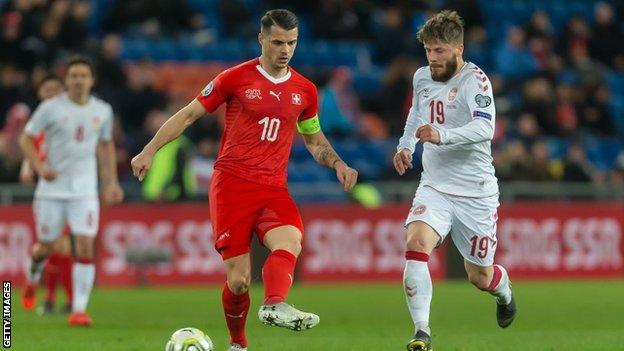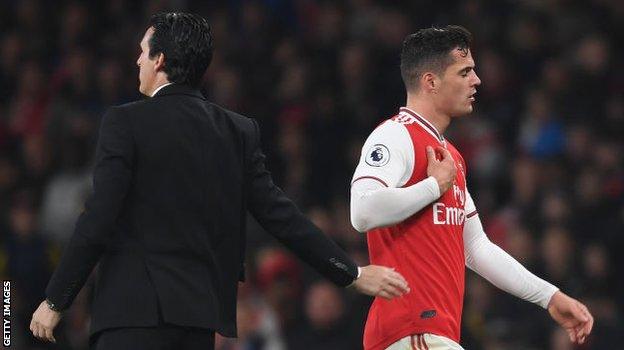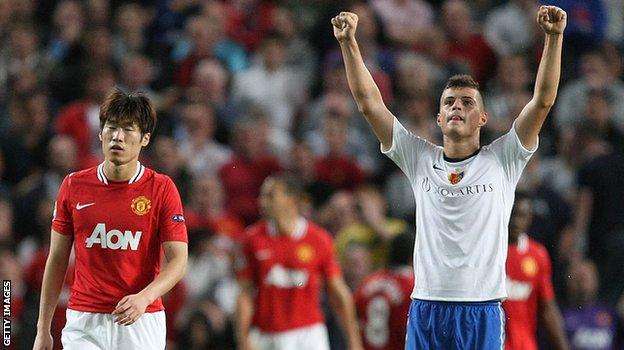Granit Xhaka: Switzerland's Euro 2020 captain divides opinion but is key to country's hopes
- Published

With 94 international appearances, Granit Xhaka is closing in on a century of caps for Switzerland
Euro 2020 |
|---|
Dates: 11 June-11 July. Venues: Amsterdam, Baku, Bucharest, Budapest, Copenhagen, Glasgow, London, Munich, Rome, Seville, St-Petersburg. Coverage: Live on BBC TV, BBC Radio 5 Live, iPlayer and the BBC Sport website and app. Click here for more details |
It has been a turbulent year for Granit Xhaka at Arsenal. In a disappointing season, in which the Gunners failed to qualify for European competition for the first time in 26 years, the central midfielder sometimes found himself shunted out to play at left-back.
That would never happen with his country.
Xhaka, 28, has endured regular criticism since joining Arsenal in 2016 and is now being linked with a move to Roma. His performances have often been questioned and he has struggled to shake off a reputation for diving into challenges - a part of his game that earned him 13 yellow cards and two reds in his first season with the club.
In 2019, he was substituted in a game against Crystal Palace to roars of delight from his own fans, reacting angrily by cupping his ear sarcastically and exchanging words with supporters as he left the pitch.

Xhaka was stripped of the Arsenal captaincy by Unai Emery after his confrontation with Arsenal fans in 2019
In contrast, Xhaka's standing is high in Switzerland, where he is captain of the national team. At Euro 2020 he is already competing at a fourth major tournament following World Cups in 2014 and 2018, and Euro 2016.
The strength of character that led to him being given the captain's armband by his country - and Arsenal at one stage too - is central to his success.
"Natural-born leader" is the phrase that comes up often in conversation with Benjamin Huggel, 15 years older than Xhaka and his midfield partner at the start of his career at FC Basel.
Huggel remembers a day Basel players were sitting in the dressing room together with Xhaka. "We asked him if he thought he could play for the senior national team," recalls Huggel. "He was so convinced he would. It was impressive as he was only 17."
Xhaka was already a world champion back then, having led Switzerland to the Under-17 World Cup in 2009.
Now, 95 caps later, he is vital to his country's Euro 2020 hopes.
"It is clear we need him," adds Huggel, who played 41 times for Switzerland.
"He is the guy who makes the difference. If he plays well, Switzerland play well. He is the most important player.
"At Arsenal, sometimes he fouls or goes quickly to the floor to tackle. Some pundits criticised him for silly defending, but I cannot understand it. Granit is valuable for controlling the game, passing and connecting the defence with the attack. If every coach puts him into the starting line-up, he has to be a good player."
Xhaka developed a winning mentality at Basel as they dominated domestically and competed in the Champions League, but his approach caused him problems when he moved to Germany.

Xhaka began his career at Basel in 2010 and played in a 3-3 Champions League draw against Manchester United at Old Trafford a year later
"When he transferred to Borussia Monchengladbach, he said something in the media that he missed this winning mentality a little bit," adds Huggel. "The media were upset with him then, but that is what he is like. He always looks forward, he walks the walk."
He would go on to skipper the Bundesliga side.
Ottmar Hitzfeld gave him his senior Switzerland debut a year before his move to Germany, against England at Wembley in June 2011, and compared him to Bastian Schweinsteiger.
Xherdan Shaqiri, another young star at Basel during Xhaka's formative years and international team-mate, was considered to be the glamour boy of Swiss football who could do special things with the ball.
But Xhaka gradually became the leader, especially after he had improved at Monchengladbach.
He was named captain of the national team in 2020 after Stephan Lichsteiner retired and formed a close bond with coach Vladimir Petkovic.
Xhaka was the obvious choice for the role even if, like at Arsenal, he has never had an easy relationship with the public.
There was tension during the World Cup in 2018 when Xhaka and Shaqiri celebrated their goals against Serbia with a double eagle gesture, a symbol representing Albania's flag.
Both their families are from Kosovo and Xhaka's father Ragip spent three and a half years as a political prisoner in the former Yugoslavia.
"As far as I know, his first few months in jail were OK. But then the beatings started," Xhaka told the Guardian in 2017., external
"The celebrations against Serbia led to a big debate in Switzerland," says Mario Gehrer, a commentator for Swiss television SRF. "It was discussed for a long time."
However, Xhaka's problem in the eyes of the public was not only the goal celebration, but also his confident character which has - paradoxically - helped him throughout his career.
In March, he gave an interview to Swiss outlet Tages-Anzeiger where he was asked what he would do if he was a woman. "I'd marry Granit," he answered., external
Gehrer adds: "From the start, there was a big confidence in his game and in general. That is not something Swiss people like. Here, everything is based on being a natural, a 'normal' person. The Swiss don't like to say that we are number one.
"It was not love at first sight between Xhaka and Switzerland. However, the love has grown over the years. In Switzerland, he's accepted everywhere, but not loved everywhere."
Evidence of Xhaka's importance to the national team came in the Euro 2020 qualifier against Denmark in 2019.
In the 79th minute, Switzerland were winning 3-0 and he was taken off. Denmark went on to score three goals in the closing nine minutes. "That's an example of what happens when he's not there," says Gehrer.
His leadership traits trace back to his childhood, which he spent playing football with his older brother Taulant, who has spent his whole career at Basel and plays for Albania at international level.
"There is a story that when they went out to play, their mother gave them a key for the flat," says Gehrer with a laugh. "Even though Granit was the smaller boy, she gave the key to him. He had the responsibility for the key - and probably for his brother too."

Sport's Strangest Crimes: What happened when wonder horse Shergar was suddenly taken?
Footballers' Favourite Foods: Can you guess what these England players' ultimate meals are?
